If you’re a fan of lemon desserts, you’ll love this easy recipe for homemade lemon curd. It’s perfect for filling cakes, cupcakes, and tart shells, or just spreading on toast. Plus, it’s really easy to make – you just need a few simple ingredients!
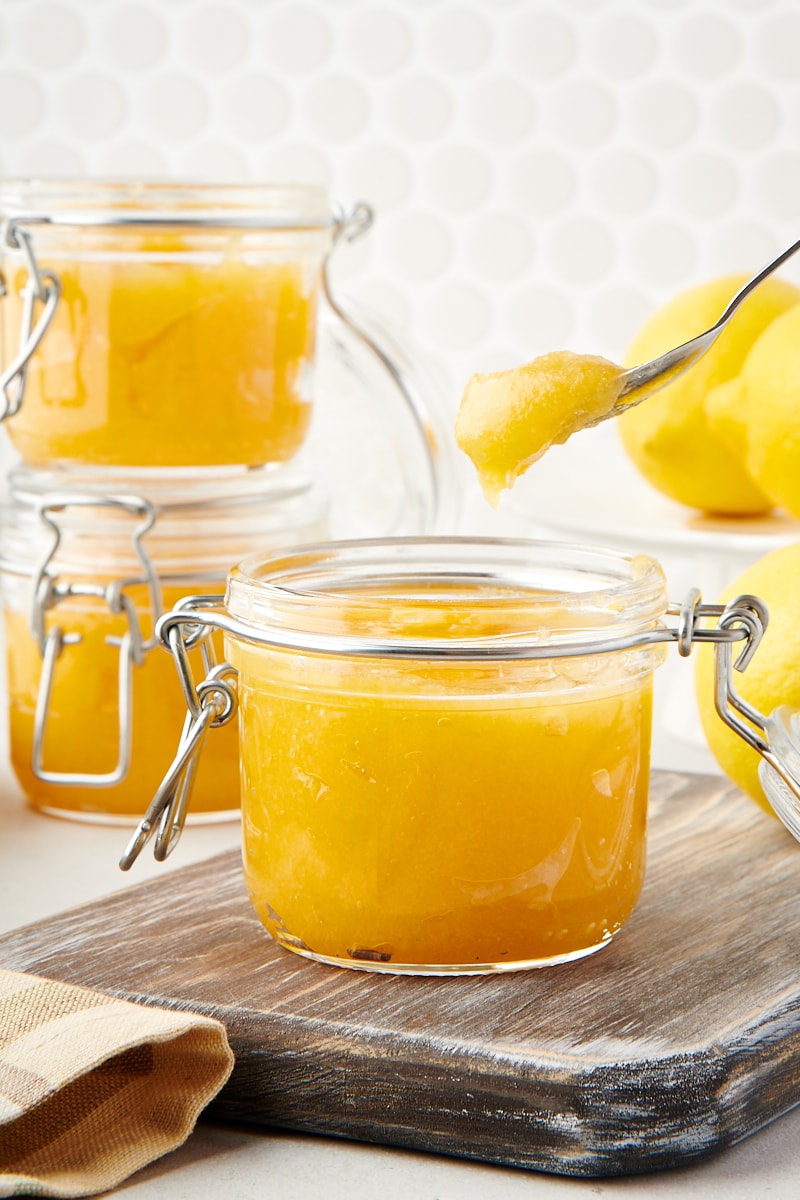
If you love all things lemon, then you’re likely already familiar with lemon curd and its intense lemon flavor. But have you ever made it yourself? Let me tell you, it’s so easy and so amazingly good!
While I certainly won’t shun store-bought lemon curd as a shortcut ingredient, I definitely prefer this homemade version. If you’ve ever wanted to try making it yourself, this is a great recipe to try as it’s simple and straightforward. Your lemon-loving taste buds will thank you!
Why You’ll Love This Lemon Curd Recipe
- Fresh is best. Nothing compares to fresh lemon curd. While store-bought is convenient, the flavors of homemade are so much better than anything you’ll find in a jar.
- Easy methods. There’s more than one way to make lemon curd from scratch. I have you covered with easy methods for the stovetop and microwave.
- Versatile. Lemon curd is such a great way to brighten up desserts, breakfast dishes, or a slice of toast! It stores well and I’m always looking for new ways to use it in recipes. I’ve included a few of my favorite ideas further in the post.
What is Lemon Curd?
Lemon curd is a sweetened lemon spread or sauce that is typically made with lemon juice, butter, sugar, and eggs. Unlike other fruit spreads and compotes, it has a custard-like texture, thanks to the butter and eggs. While lemon curd can be store-bought, it is also surprisingly easy to make at home.
This particular recipe is my favorite for making lemon curd. I like that it can be made on the stovetop with a more traditional method or in the microwave for a quicker, easier take.
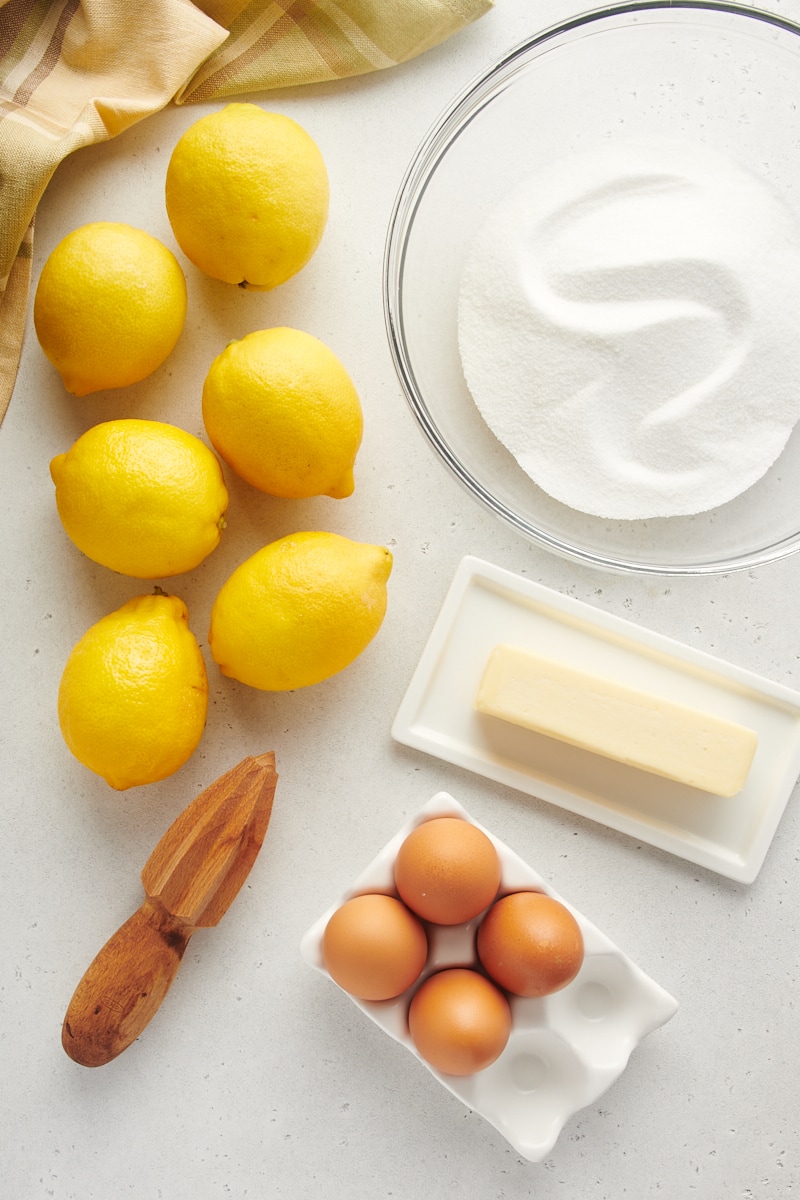
Ingredients
You only need four ingredients to make this simple homemade lemon curd. These are some notes on the ingredients. Be sure to scroll down to the printable recipe card below the post for the full amounts and recipe details.
- Lemons – You’ll need about 6 medium lemons for this recipe. See my notes below about choosing the best lemons to make curd.
- Unsalted butter – The butter adds wonderful flavor and texture to the curd, so be sure to use one of good quality.
- Granulated sugar – If you want a less sweet, more lemony curd, you can dial back the amount of sugar. Keep in mind that less sugar can make your curd more lumpy.
- Eggs – Some recipes for lemon curd use a different ratio of egg yolks and egg whites, but we’re keeping things simple with whole eggs.
What Kind of Lemons Make the Best Curd?
While any lemon can be used to make curd, some varieties that are particularly well suited for this purpose. These are the main types of lemons that I recommend for this recipe:
- Eureka lemons – These have a strong lemon aroma and are relatively easy to find. Lisbon lemons, another common lemon, are also a good choice, though slightly more acidic.
- Meyer lemons – Meyer lemons make excellent curd, although they are not widely available year-round. But if you can find them, use them! Their sweet and floral flavor makes for a little different lemon curd experience. These lemons are less acidic than other lemon varieties, which results in a smoother and more balanced curd.
For the best flavor, look for lemons that are fragrant and have thin skins. Another important tip is to look for unwaxed lemons as you’ll be using the zest. If you’re unable to find unwaxed varieties, you can try scrubbing the lemons well to try to remove as much of that wax as possible.
No matter which type of lemon you choose, you’re sure to end up with a delicious and tangy curd!
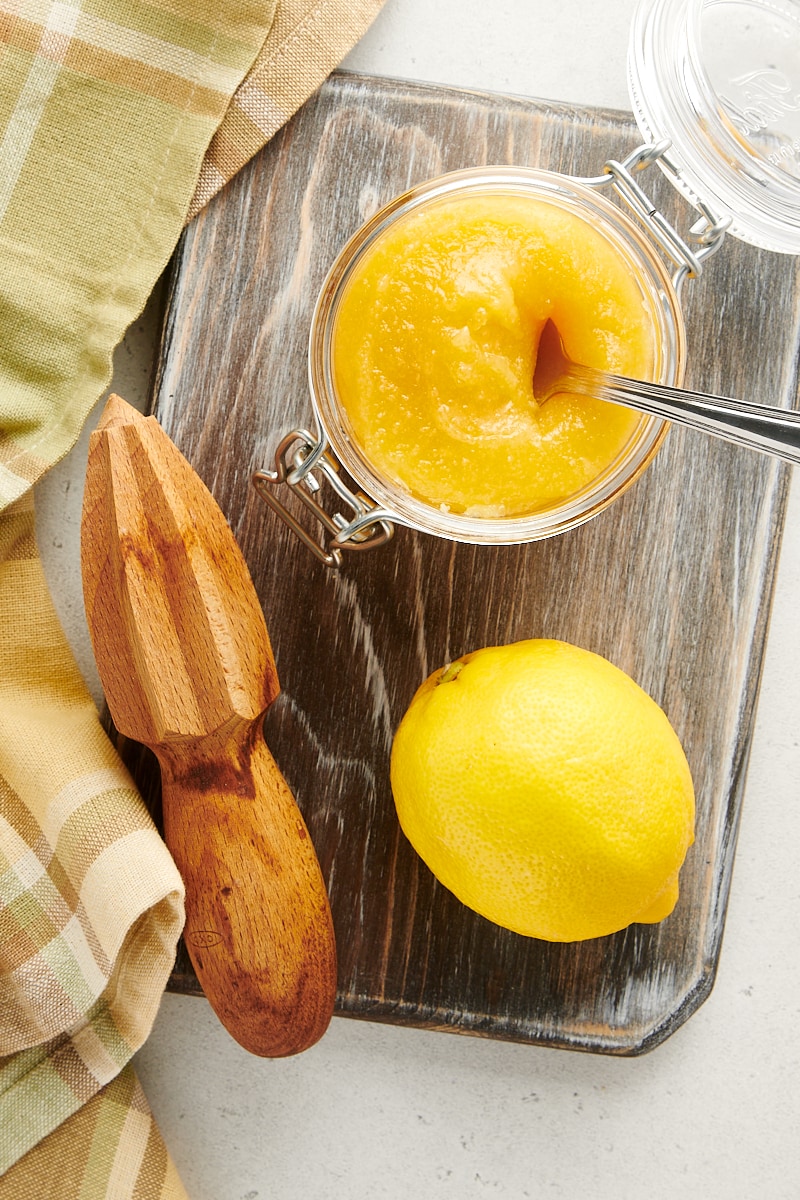
How to Make Lemon Curd
This recipe for lemon curd can be made either on the stovetop or in the microwave. Either way, the mixing portion is the same, so just choose whichever method you prefer.
- Zest and juice the lemons. Start by zesting the lemons and squeezing the juice. Check out my tutorial on how to zest and juice lemons if you need some pointers.
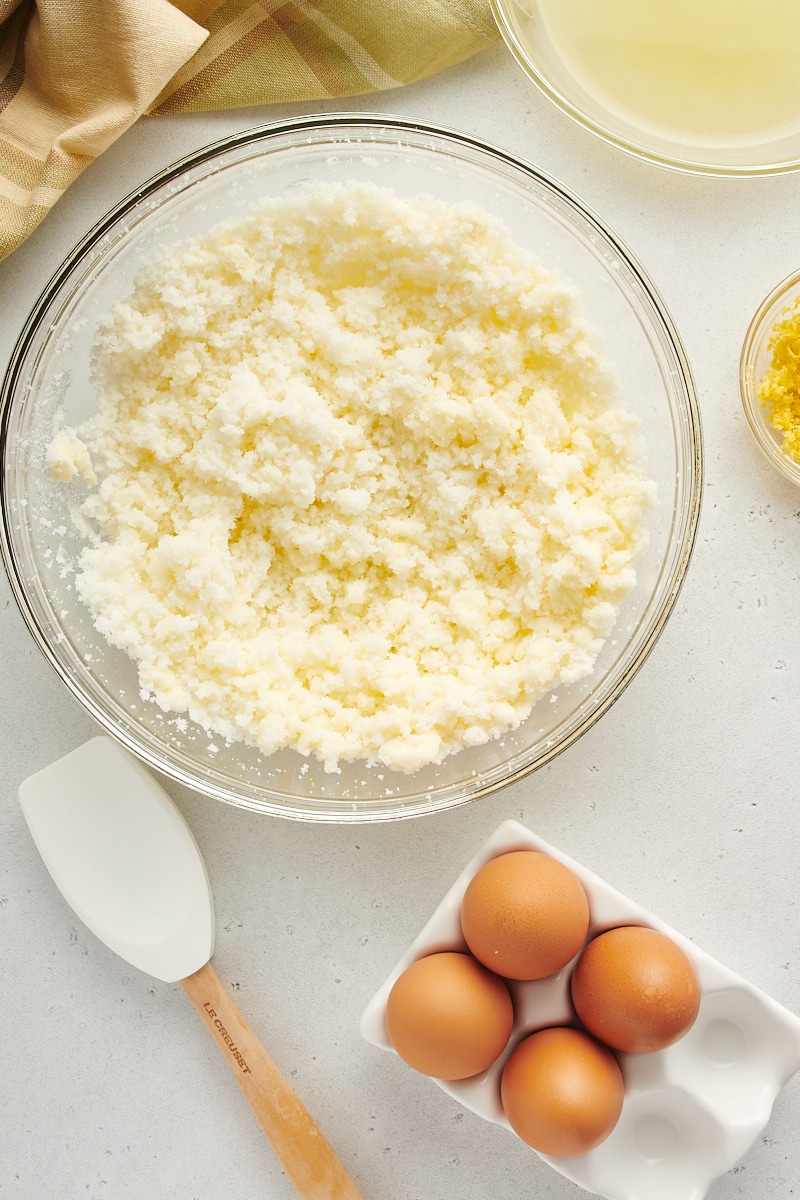
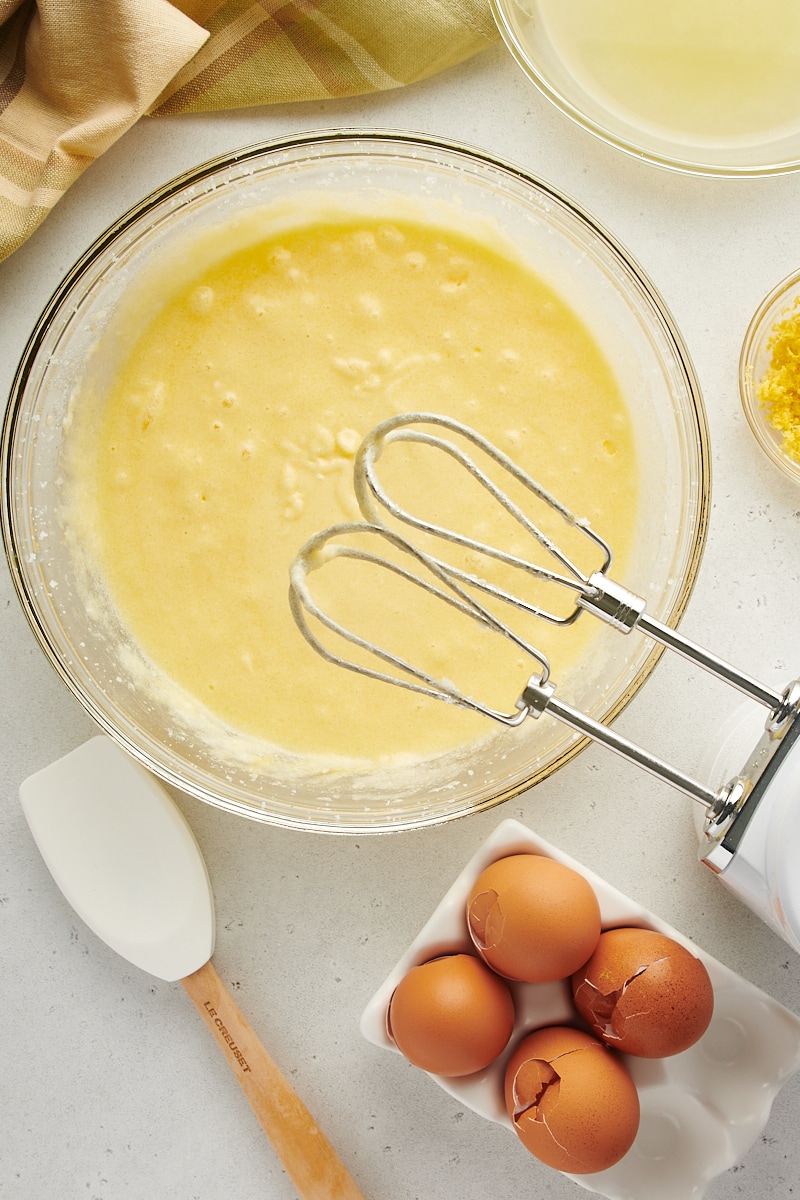
- Beat the butter, sugar, and eggs. With an electric mixer on medium speed, beat butter and sugar until it’s fluffy and lighter in color. Next, add the eggs one at a time, mixing well after adding each one.
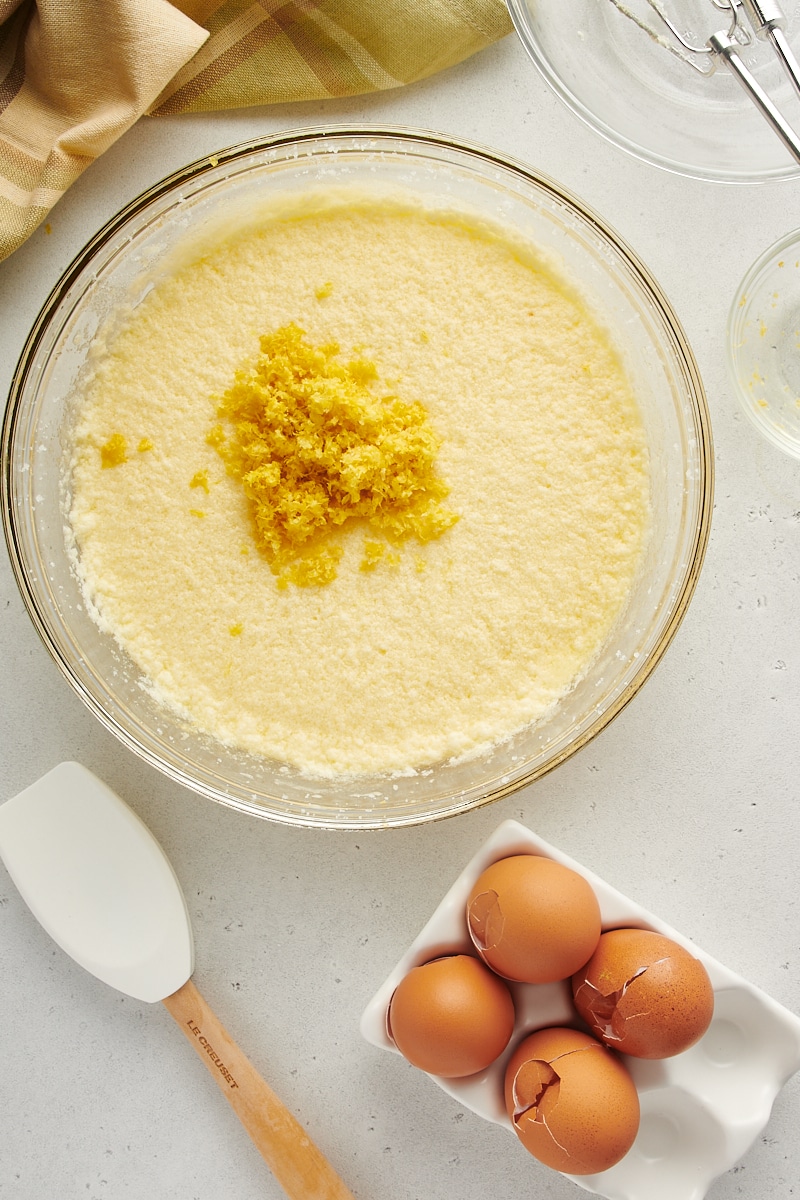
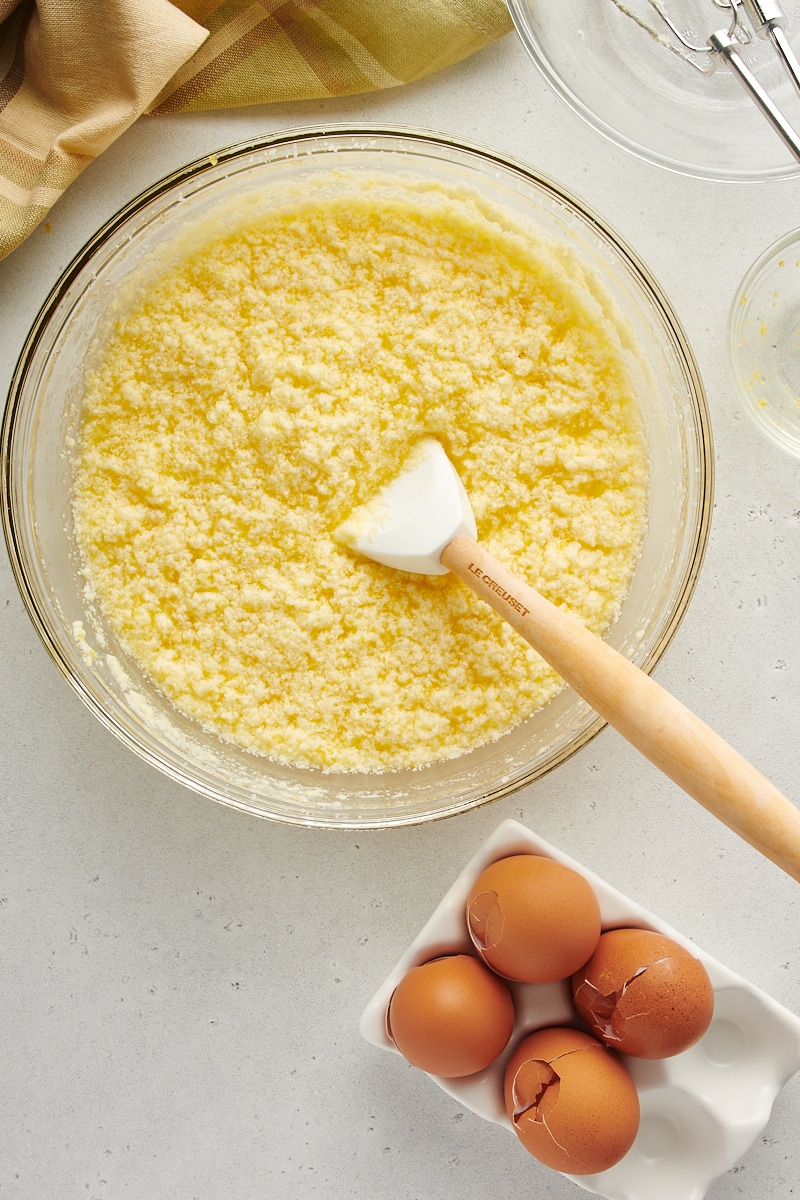
- Add the zest and juice. With the mixer on low speed, gradually add the lemon juice. Mix just until combined. Stir in the lemon zest. At this point, the mixture will look curdled.
- Cook. Use one of the methods described below to cook the curd until thickened. Remember that it will thicken as it cools.
Microwave Method
Keep in mind that all microwaves are different, so it may take more or less time to get the curd to the right consistency.
- Heat on high. Make sure you’re using a large microwave-safe bowl. Microwave the mixture on high for 5 minutes, stirring every minute.
- Continue heating in 30-second intervals. Stir after each interval for another 2-3 minutes until the mixture thickens enough to coat the back of a spoon. It should start to mound slightly as it’s stirred.
- Chill. Place plastic wrap directly onto the surface of the curd, covering well. Refrigerate for at least 4 hours. If you like, you can transfer the curd to individual jars for storage or gifting.
Stovetop Method
- Heat the mixture in a saucepan. Place the mixture in a heavy saucepan. Cook over medium-low heat, whisking constantly. The temperature shouldn’t be so high that the mixture bubbles.
- Cook and whisk. Continue cooking and whisking until the mixture thickens and coats the back of a spoon. This usually takes 10 to 15 minutes. If you have a candy thermometer, you can check the curd for doneness. It should reach 170-180°F.
- Chill. Transfer the curd to a bowl, cover, and refrigerate.
Do I Need to Use a Double Boiler?
Some people swear that a double-boiler is a must for making lemon curd on the stovetop, but I don’t find that to be true as long as it is cooked over the appropriate heat and whisked regularly. That being said, it’s still a consideration, especially if your stovetop’s temperature is a bit unreliable.
If you find that you need or want to use a double-boiler, be sure to use a glass or non-reactive metal bowl for the curd. Then, follow these instructions:
- Assemble. Place it over a pot with a couple of inches of simmering water. Make sure the bowl with the curd mixture doesn’t touch the simmering water in the pot below.
- Cook. Cook as directed in the recipe. You may also need to add a few minutes to the expected cooking time.
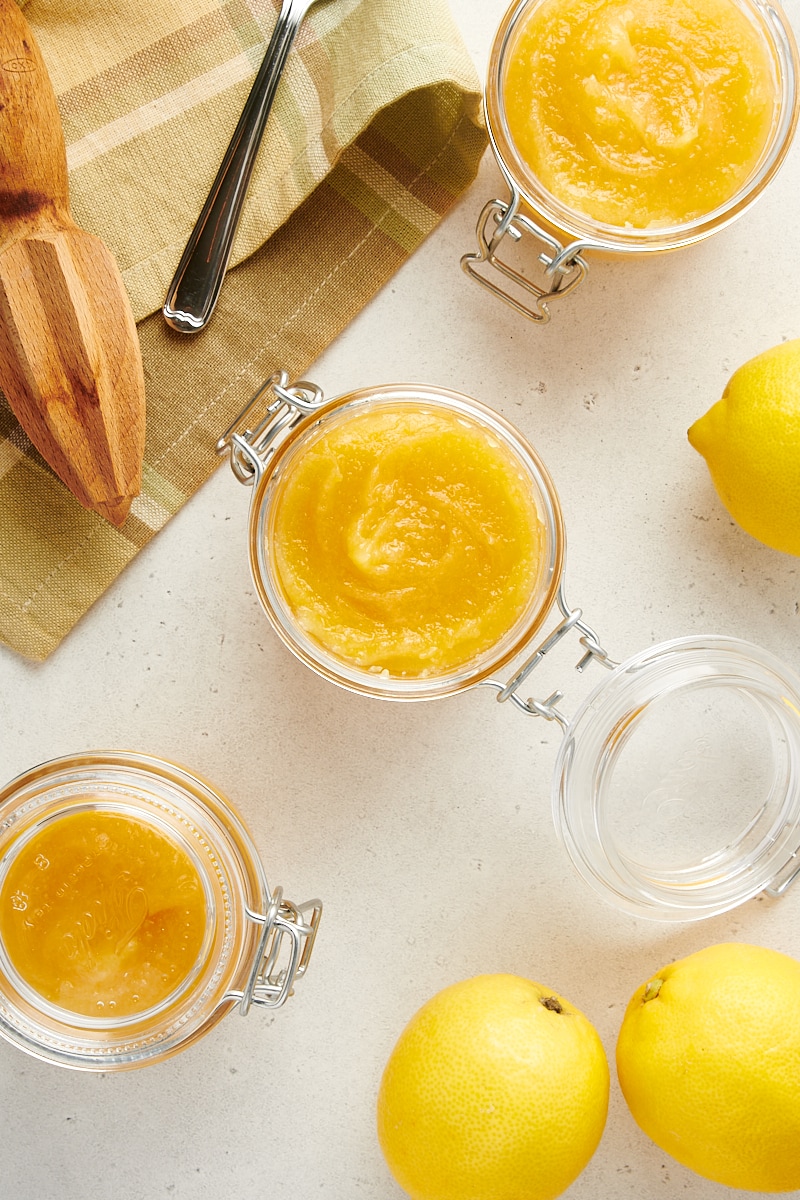
Tips for Success
- Use fresh lemon juice. It may be tempting to use bottled lemon juice, but you’ll be far happier with the results you’ll get from using fresh lemons.
- Don’t skip the zest. You’ll get a better lemon flavor and prettier color with the zest. Be sure to zest only the outside rind and not the pith underneath. I recommend a fine grater like a microplane to get very small pieces of zest.
- Get the right consistency. Lemon curd is ready to come off the heat when it’s thickened and smooth. It should coat the back of a spoon, and leave a trail if you run your finger through it. Think of it like a pudding that’s more pourable. If your curd is thick but not as thick as it should be, keep cooking.
- Cook the curd for long enough. Thin, runny lemon curd likely didn’t cook long enough. You can try returning it to the heat and continue cooking it. Or, embrace that you made a delicious lemon sauce!
- Try other citrus fruits. Lime, orange, and grapefruit will all make delicious curds, too.
Uses for Lemon Curd
Lemon curd is a delicious and versatile spread that can be used in a variety of ways. A simple way to enjoy it is to spread it on toast or scones. Try it on muffins, waffles, and pancakes, too! It also makes a great filling for cakes, pies, and cookies. Try my lemon yogurt crumb cake, these ginger lemon hand pies, or lemon thumbprint cookies. A little bit hidden inside a lemon cupcake is sure to please even the biggest lemon lovers. Or, simply use it as a topping for ice cream or yogurt. If you’re a fan of all things lemon, I’m sure you’ll find all sorts of ways to put your homemade lemon curd to good use!
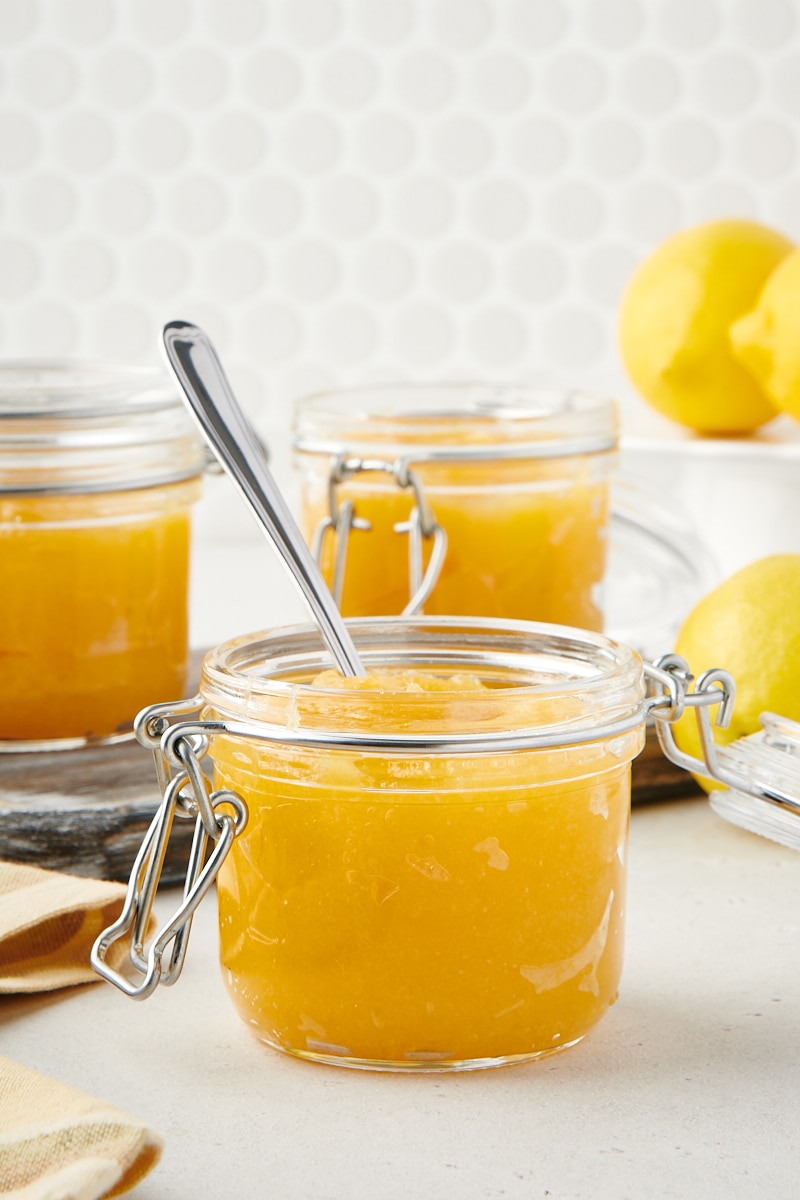
Frequently Asked Questions
This is optional. Straining the lemon curd will catch any seeds or big bits of lemon zest that may have made it into your mixture. Secondly, it will remove any bits of egg that may have scrambled a bit while cooking. If you want or need to strain your lemon curd, use a fine mesh sieve.
If your lemon curd doesn’t thicken up, it’s most likely due to incorrect amounts of lemon juice or eggs. You can try whisking some of the mixture with another egg yolk and then slowly whisking that back into the curd. Cook a bit longer, and it should thicken.
Lemon curd that has been overcooked will be lumpy, curdled, and have a pronounced egg flavor. You can try to rescue it by removing it from the heat and whisking it really well to make it smooth (or use a blender or immersion blender). Afterward, strain it and then continue cooking.
Lemons can react with some metals, giving your curd a slight metallic taste. If you’re cooking the curd on the stovetop, be sure to use a non-reactive pan to avoid this. A stainless steel or glass bowl works well.
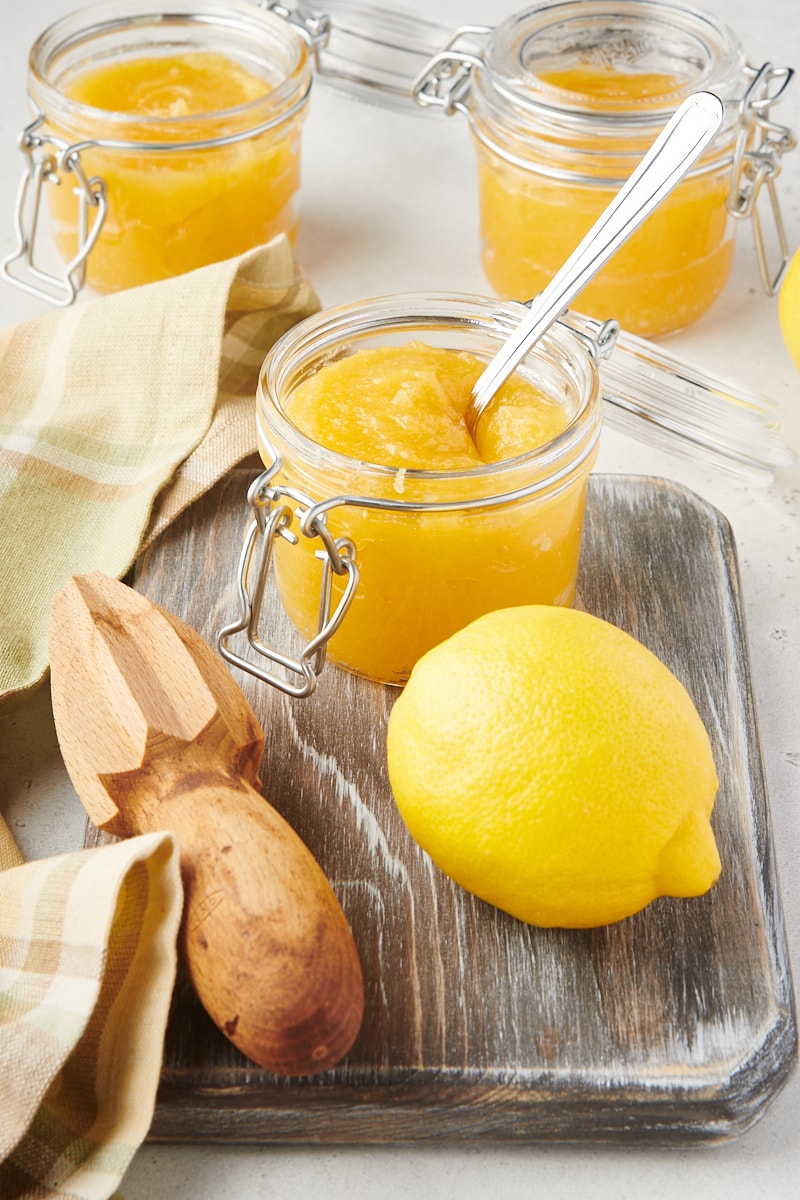
How to Store
- Refrigerate. Lemon curd should keep up to 2 weeks in an airtight container in the refrigerator.
- Freeze. Place the curd in a freezer-safe container and press a layer of plastic wrap on top before sealing. Leave about 1/4 inch or so of space at the top to allow for any expansion as it freezes. Properly stored, it will keep for several months, maybe even a year! Thaw it overnight in the refrigerator.
More Lemon Recipes
Lemon Curd
Learn how to make lemon curd from scratch! Use this bright, tart, and versatile homemade lemon spread as a topping or filling for your favorite lemon desserts, and more.
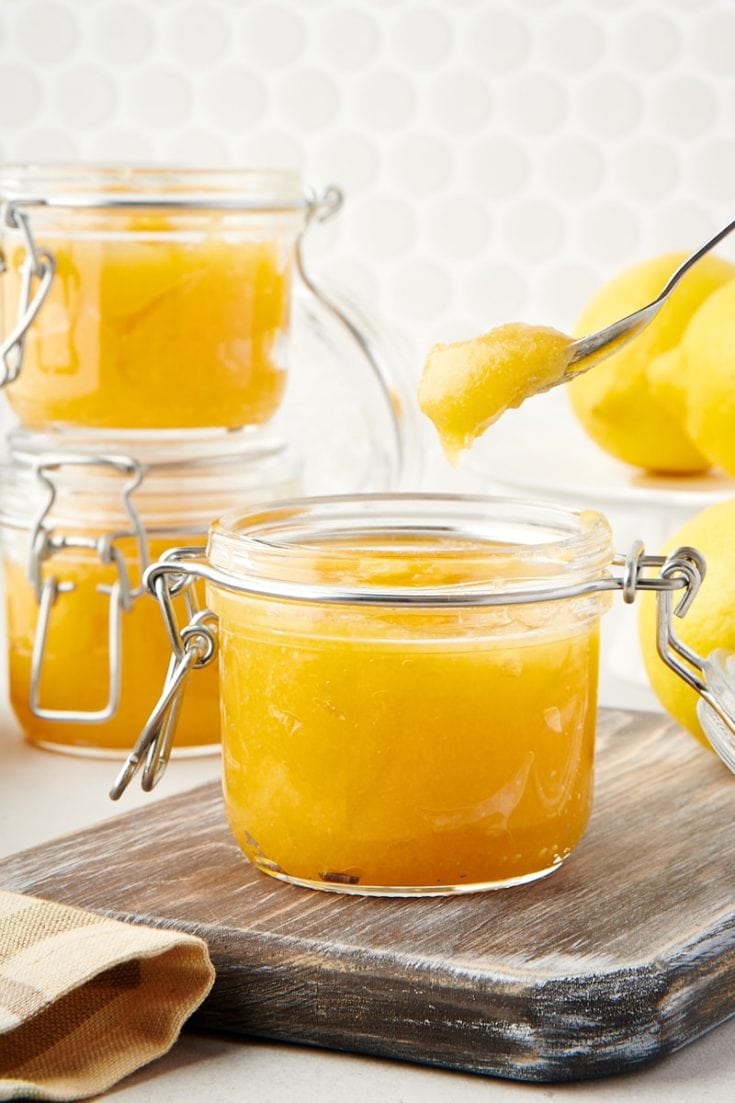
Ingredients
- 6 medium lemons
- 1/2 cup unsalted butter, softened
- 2 cups granulated sugar
- 4 large eggs
Instructions
- Zest the lemons for a total of 2 tablespoons of zest.
- Juice the lemons for a total of 1 cup of juice.
- Using an electric mixer on medium speed, beat the butter and sugar until light and fluffy. Add the eggs, one at a time, beating until blended after each addition.
- Reduce mixer speed to low. Gradually add the lemon juice, mixing just until blended. Stir in the lemon zest. The mixture will look curdled.
- To make on the stovetop: Place the mixture in a heavy saucepan. Cook over medium-low to medium heat, whisking constantly. Cook until the mixture thickens and coats the back of a spoon. This should take 15 to 20 minutes.
- To make in the microwave: Place the mixture in large microwave-safe bowl. Heat in the microwave on high for 5 minutes, stirring after every minute. Continue heating in 30-second intervals, stirring after each, for another 2-3 minutes until the mixture thickens and coats the back of the spoon.*
- Transfer the mixture to a bowl. Cover with plastic wrap, placing the wrap directly onto the surface of the lemon curd. Chill at least 4 hours.
- Store refrigerated up to 2 weeks in an airtight container.
Notes
*Microwaves vary greatly, so your cooking time may also.
Recipe adapted from Southern Living.
Recommended Products
Bake or Break is a participant in the Amazon Services LLC Associates Program, an affiliate advertising program designed to provide a means for us to earn fees by linking to Amazon.com and affiliated sites.

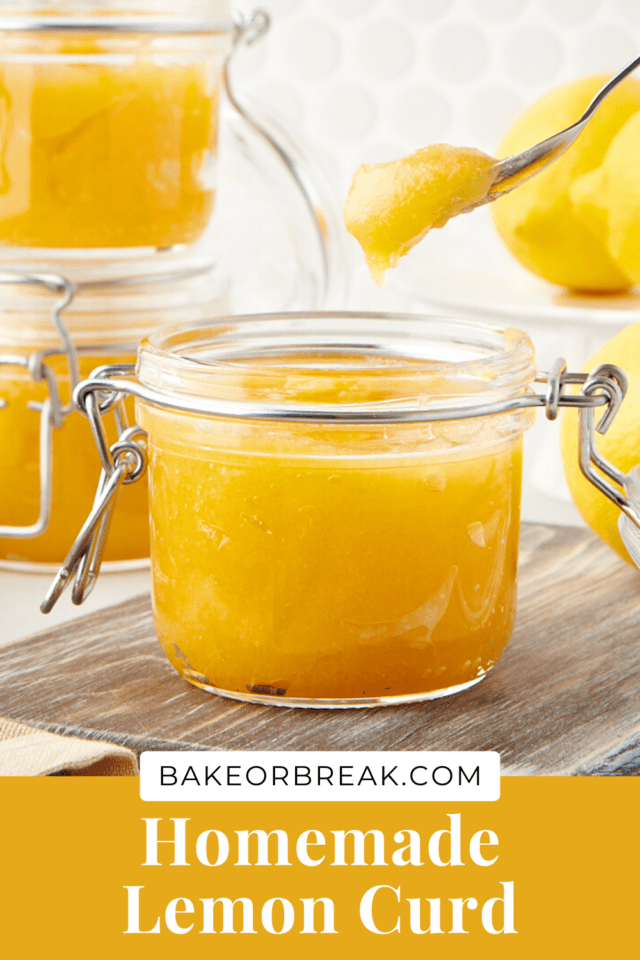



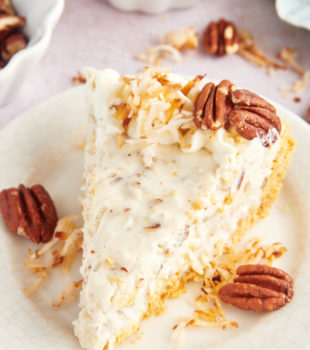
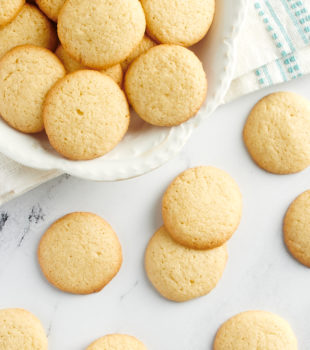
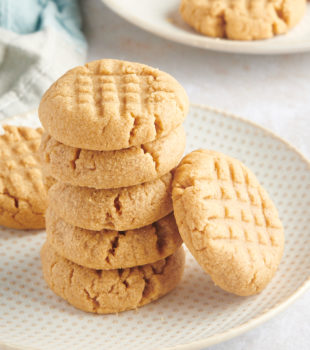
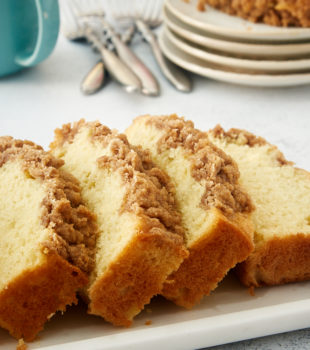
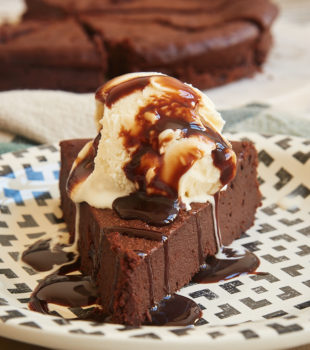
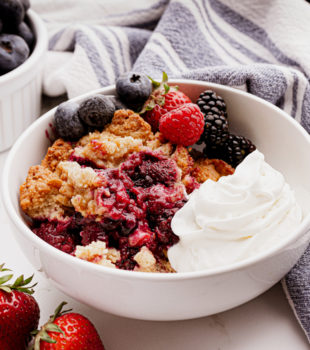
21 Comments on “Lemon Curd”
This recipe makes me smile on this winter, snowy Midwest day:)
Thanks for sharing this wonderful recipe! I was so happy to see your post—right after I baked some English scones! 🙂 Lemon curd is the perfect accompaniment! I included a link to this recipe in my blog, and I look forward to trying it! 🙂
I too am commenting from the Midwest. This is a must try recipe. Since I was a little girl, I enjoyed watching my grandmother making this and a plain cheesecake. When all was cooled, she piled the lemon curd on top of the cheese cake then decorated with a few slices of lemons. Slice and pass the whipped cream. Delish. We never got the recipe and now I can make it myself. I’m from the south where we all love our lemon anything.
Would this work for lemon meringue pie filling?
Confession: I’ve never made lemon meringue pie! You can definitely use lemon curd as a pie filling for a pre-baked pie shell. Because lemon meringue pie is cooked with the filling, I would guess that you would need to prepare it differently.
We LOVE lemon curd! I have a jar in my pantry at all times, and there is one sitting in there now :). I really want to make my own soon…we put it over toast, yogurt, scones, even ice cream :). Anything goes with sweet, tangy lemon curd. Thanks for sharing!
Hello Jennifer,
There is an even easier way to cook lemon (or any other) curd:
Mix all ingredients in a microwavable bowl and microwave on MEDIUM for about 10 minutes, checking after every 2 minutes, or until curd has thickened. Easy-peasy!
Hi, Ingrid! I debated trying this out in the microwave, but I decided to go the stovetop route this time. I’ll have to try the microwave method next time.
I adore lemon curd! Especially when slathered between the layers of a cake…
Aaaaaaaand now I want cake.
I’ve been seeing this one or a similar one where it eliminates the problem of cooking the egg whites when tossing the eggs straight into the pot instead of the mixing. I haven’t tried it but did manage to buy the lemons (both Meyer and regular) to try it. Thanks for nudging me a bit more before those lemons are too far gone. I adore homemade lemon curd. I will buy for a quick recipe where the lemon curd is IN something but when it is the star–homemade is definitely the best. Nothing bought tastes as good!
Homemade lemon curd is totally worth the bit of extra time it takes to make it!
Being the lemon lover that I am, lemon curd is one of my favorite things. I usually make it around Christmas time, but you’re making me want to make another batch (as my stash is already gone)!
Hey – regarding comment that lemon meringue pie is cooked with the filling. It isn’t, actually. The meringue is piled on top of the pie and just in oven long enough to brown the meringue. The pie filling is not baked as part of the process – unless there’s another way of doing it that I don’t know about.
I think my hubby would leave me if someone would offer him a good lemon pie. He really doesn’t care for meringue, so just make the lemon curd and put it in a pre-cooked pie shell and let him have it..so now I may be able to keep him for a while longer…LOL…
What do you think about making a bigger batch and freezing the lemon curd for later use? How do you recommend doing that, And for how long is it good to be frozen? Thanks. Looks yummy!
I’ve never frozen lemon curd, but everything I’ve read says that it freezes well for up to a year. Just thaw it for a day in your refrigerator, and it should be good for about a week afterwards.
i Jennifer first of all I love every recipe of yours than I have made. Including this lemon curd which I have made for your lemon cream pie recipe, so very good! My question is that I have a large surplus of lemons and would like to make the lemon curd to give as gifts, would it be okay to prepare the recipe in a triple amount or a bit more? Thank you
Hi, Meg. I’ve not tried scaling it, but I don’t think it would be an issue.
The lemon curd was scrumptious. I made it to go with your lemon cake recipe. If I had known the lemon curd would be so delicious I would have made a full batch! Thank you so very much for sharing.
I’m so glad you liked it, Erin!
KARISHMA. I freeze lemon curd every year. It keeps well without any degradation in texture, flavor, or color. I prefer curd with Meyer lemons, so I have to use them up when in season. I have also frozen the lemons whole.